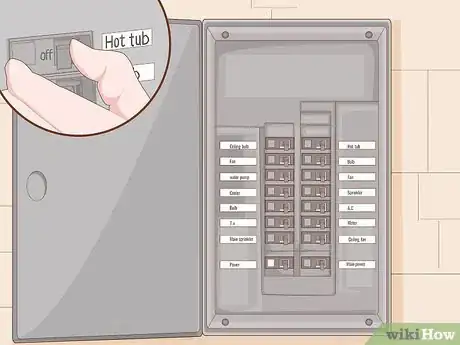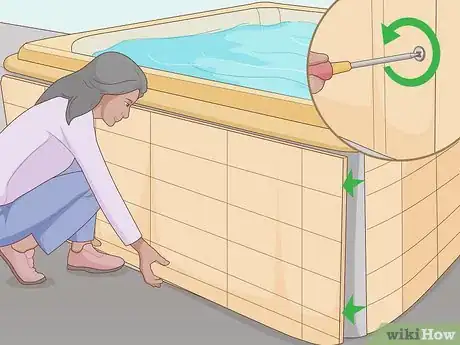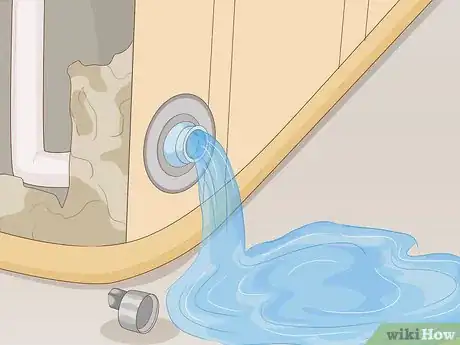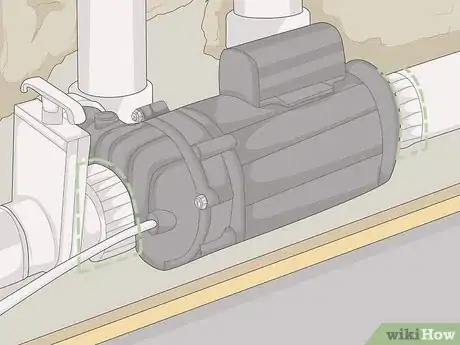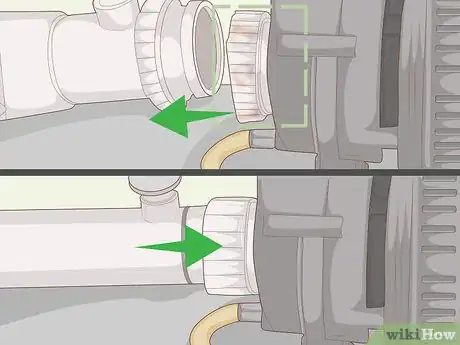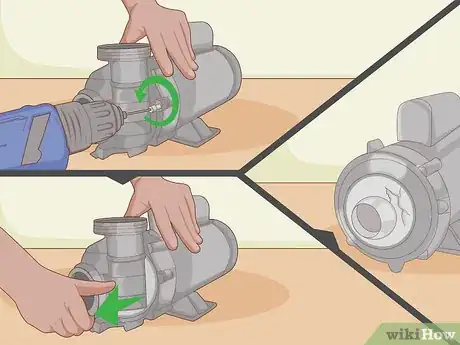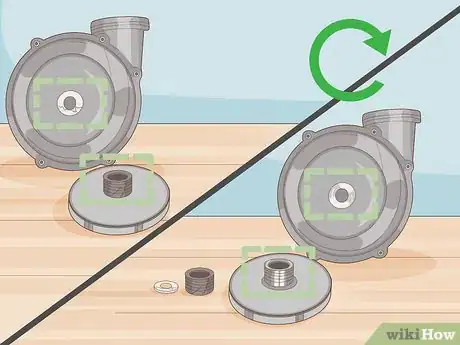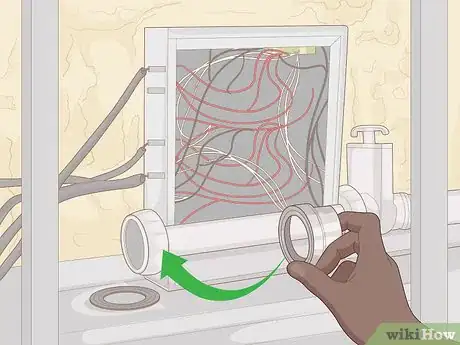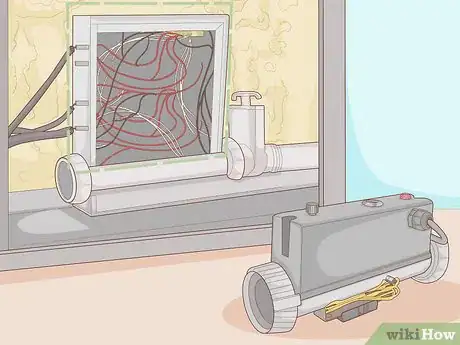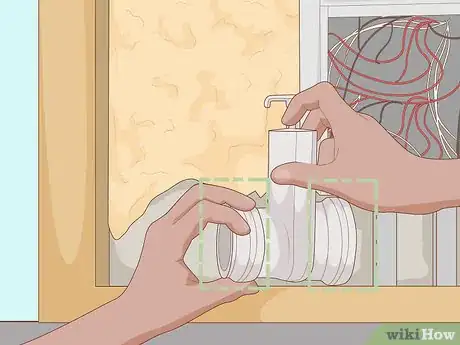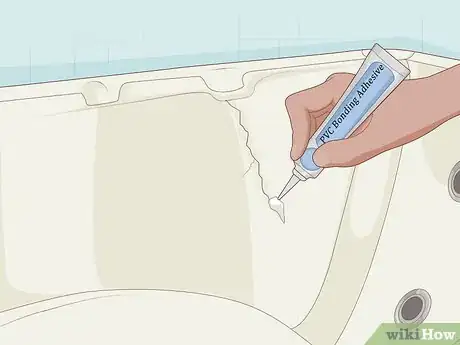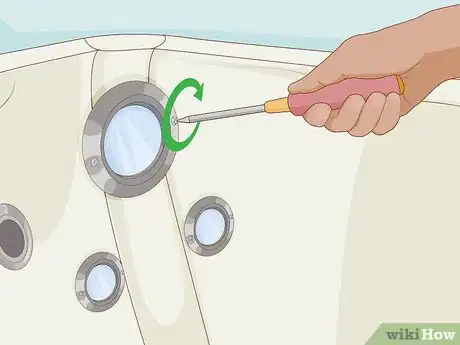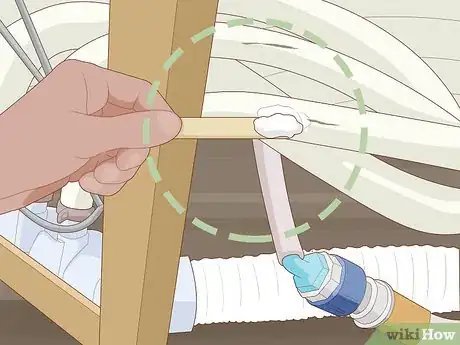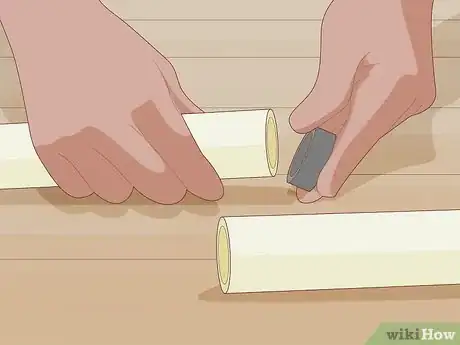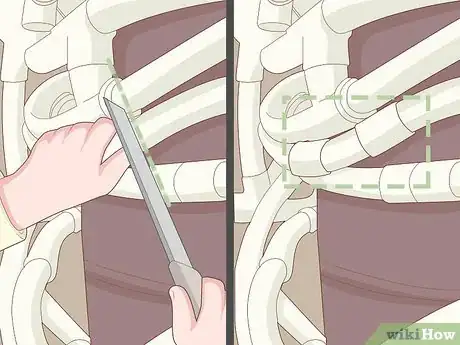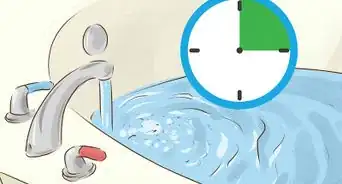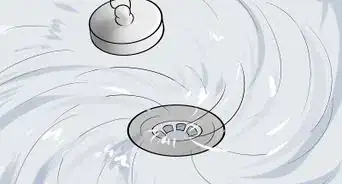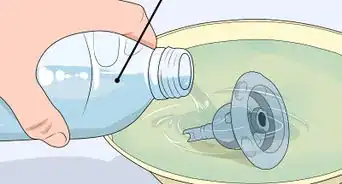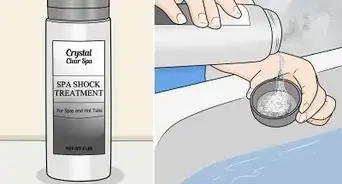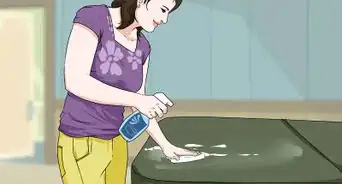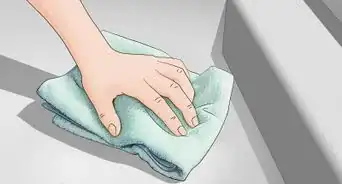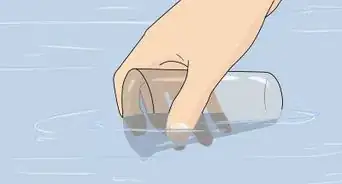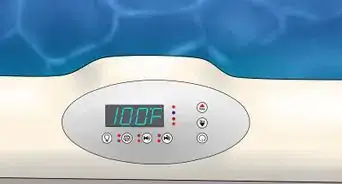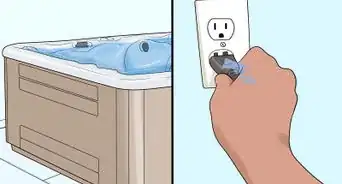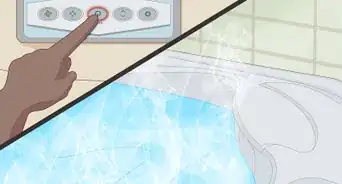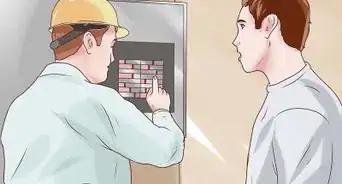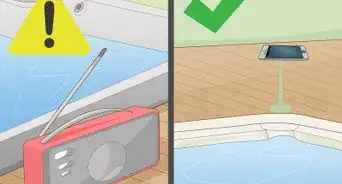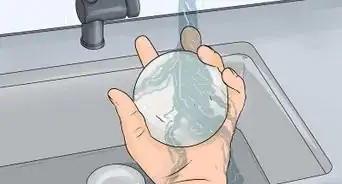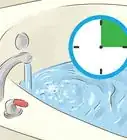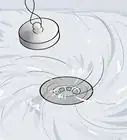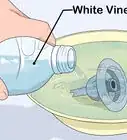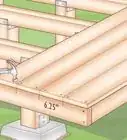This article was co-authored by Oz Tzalalihin. Oz Tzalalihin is a Project Manager for Vitoli Builders, based in Calabasas, California. He has a passion for working with sloped terrains and has shared his expertise through contributions to local publications. Oz holds a PMP (Project Management Professional) degree from Cornell University and specializes in building pools and structures on hillside properties. With his education and experience, he is a valuable asset to Vitoli Builders and is dedicated to delivering quality results and smooth construction.
There are 17 references cited in this article, which can be found at the bottom of the page.
This article has been viewed 24,166 times.
Hot tubs develop leaks as they age and experience changing temperatures. Handling a leak may seem intimidating at first, but most repairs are simple to complete with the right replacement parts. The most common spot for leaks is the pump, which can be repaired or replaced with new components. If the pump isn’t the issue, check other components like the heater and the jets. Rarely, PVC pipes need to be repaired or replaced instead of tub parts. Identify leaking components and replace them as soon as possible to get your hot tub up and running again.
Steps
Finding Hot Tub Leaks
-
1Disconnect the power supply to the hot tub using a circuit breaker. Walk to the circuit breaker in your home, which is usually in the garage, basement, or another storage area. Flip the circuit controlling power to the outdoor area. If you have a plug-in hot tub, also pull its power cord out of the wall outlet. Test the hot tub before continuing by trying to turn it on.[1]
- If you’re unsure which circuit or fuse switch controls the hot tub’s electrical supply, flip the main switch. The main switch shuts off power to your entire home.
- Notify anyone else in your home that you plan on working on the hot tub so they don’t flip the power back on by accident.
-
2Remove the side panels as needed to access the hot tub’s underside. The way the panels attach varies depending on the model of hot tub you own. Many of them use screws. Look for the screws on the ends of the panels. Use a cordless screwdriver to turn the screws counterclockwise until you are able to slide the panels off the hot tub.[2]
- Some hot tubs, especially older models, may have stapled panels. Pull the staples out with needle-nose pliers to remove the panels.
- If you can’t get the panels off after unfastening them, try prying them off. Slide the flat end of a pry bar underneath the bottom corner of the panel, then lightly pry the panel up until you are able to grab it.
Advertisement -
3Drain the water in the hot tub to locate the leak. Find the drainage valve along the bottom edge of the hot tub. Attach a garden hose, then open the valve to drain the water. As the water drains, watch the hot tub’s underside to identify any noticeable leaks. Also, note any spots where the insulation inside the hot tub looks damp.[3]
- Use the garden hose to divert the draining water away from the hot tub. Keep the other end situated in a big bucket or another container to prevent the water from spilling all over your lawn or patio.
- You may need to refill and drain the hot tub a few times to locate leaks. If you’re having a hard time, try dyeing the water with a bright food coloring to make the leaks more visible.
Repairing a Leaking Pump
-
1Tighten the unions on the pump if they are leaking. Locate the pump, which usually looks like a 2-part black cylinder with a couple of white pieces attached to it. The white PVC pieces are the unions that connect the pump to the pipes. Look for the ring-shaped components over the unions. Twist the rings clockwise by hand as far as you can to tighten the connections.[4]
- The pump, particularly around the unions, is the most common cause of leaks. If you feel water around the unions when you touch them, the unions are the problem and need to be tightened.
- Every pump has 2 unions, 1 for each pipe it connects to. The first union is on top of the pump and the second is on the front end. Remember to check and replace both as needed.
- Test the unions by draining more water from the hot tub. If the unions continue to leak, you may need to replace them or the pump.
-
2Remove and replace the unions if they are broken. To remove the unions, turn the ring connectors counterclockwise with a wrench. Each union consists of 2 connecting pieces held in place by the ring. After loosening the ring, slide the union off the pump and plumbing. Replace the broken component or the entire union with an identical piece.[5]
- Union pieces, along with all other replacement parts, are available online and at pool and spa supply stores.
- Measure the diameter of the union’s opening to get a replacement. The hot tub’s pipes need to fit inside the union.
-
3Twist off the end of the pump if it is still leaking. A hot tub pump has a dry end that houses the motor and a wet end containing the water pump. The wet end piece, called a volute, is taller and much thinner than the horizontal chamber with the motor in it. Look for a small bolt near the bottom of the cover to turn clockwise. After removing the bolt, turn the cover counterclockwise by hand to pop it off of the dry end of the pump.[6]
- The wet end of the pump is the one with the unions on it. Remove the unions first to detach the pump from the hot tub’s plumbing.
-
4Replace any cracked components inside the volute. Inspect the outer surface of the volute, then pull out the individual parts. Pull out the cover, the large, circular impeller, and the wet end housing attached to the pump. Check each part for damage, including the black rubber rings waterproofing the inside of the cover and housing. Pull out the rings as needed with your fingers or the tip of a screwdriver.[7]
- The volute separates into 2 halves. Check both halves for cracks and parts to inspect.
- Purchase an identical replacement part online. Most pumps have a make and model number printed on them, allowing you to track down exactly what you need from a supplier’s inventory.
-
5Remove and replace the shaft seal if you don’t see any damage. The shaft seal consists of 2 parts, so look for half inside both the round impeller component and the base housing attached to the pump. Pry the parts out with a flathead screwdriver, then measure their height and diameter. Shop for an identical replacement part to slide back into the pump assembly.[8]
- Keep in mind that shaft seal models differ between hot tubs. One type of shaft seal is a tall cylinder of rings and the other is an exposed rubber ring. They are not the same, so getting the correct type is important.
Fixing Hot Tub Features
-
1Replace the union gaskets on the heater if they are leaking. Find the heater, which is an enclosed black box on top of one of the pipes under the hot tub. A couple of screws hold it to the pipe, so turn the screws counterclockwise to remove the heater. Then, use a wrench to turn the ring-shaped connectors at the ends of the pipes counterclockwise. Replace the black rubber o-rings on the ends of the unions with new ones identical in diameter.[9]
- If you need to replace a cracked or broken union, measure its diameter first, then purchase an identical part. Consider replacing both gaskets at the same time.
-
2Get a new heater if the old one continues to leak. In rare cases, the heater may be the problem instead of an easily-replaced component like the gaskets. Purchase a replacement heater and fit the new pipe in place by threading it into a pair of unions. Screw the new heater to the top of the pipe, then begin attaching the electrical wires as needed. Match the wires with same-colored wires in your home’s electrical circuit, twisting the ends together and holding them in place with rubber heat shrink tubing.[10]
- Check the heater for a manufacturer’s make and model number printed on it. If the numbers are there, use them to purchase an exact replacement. Otherwise, search for your hot tub’s make and model online to find identical heaters.
- Electrical work can be dangerous, so consider calling a professional electrician or hot tub installer for help.
-
3Inspect all of the valves around the pipes under the hot tub. The valves, especially the ones around the pump, often come loose and leak. Most valves consist of 2 halves held together by screws. Push aside the insulation in the way, then turn the screws counterclockwise. Fit a new valve in place between the pipes to control the water flow.[11]
- The water valves generally look like white squares of PVC pipes. They are situated all throughout the plumbing where pipes connect.
- If you can, get an identical valve component. Measure the valve’s diameter or take it with you to a home improvement or spa supply store.
-
4Install new jets if the old ones feel loose or leaky. Dig through the foam insulation with a spoon or screwdriver to expose the jets. The jets look like white spouts on the hot tub’s underside. Twist the jets counterclockwise by hand to remove them. Then, fit a new, identical jet into the groove, turning it clockwise to lock it in place.[12]
- Jet installs are pretty simple and don’t require much in the way of tools, but consider spreading a little silicone sealant under the new jet to waterproof it. Get a tube of sealant from your local home improvement store.
- For an easy way to find a leaky jet, look for wet spots on the foam. Follow the moisture toward the jet.
-
5Repair the frame if you notice cracks in it. Hot tub frames are very strong, but they do crack and leak on occasion. Use a tube of a store-bought PVC bonding adhesive. Fill the crack with the liquid adhesive, then let it dry for at least 15 minutes before filling the hot tub again.[13]
- Use a liquid adhesive so you can mix some waterproof latex paint in with it to hide the crack.
-
6Tighten the locknuts around any leaking spa lights you have. Push the foam insulation out of the way to access the lights on the underside of the tub. Look for a couple of nuts positioned on bolts holding the lights in place. Turn the nuts clockwise with a wrench until they begin to resist turning. Then, test the hot tub by filling it with water again.[14]
- If the lights still leak, turn the nuts counterclockwise to remove them. Purchase a light kit from a hot tub supplier to replace the leaky light. Use your hot tub’s make and model number or the light itself to find a replacement piece.
Fixing Leaky Plumbing
-
1Fill small cracks in leaky pipes with a bonding adhesive. Purchase a liquid bonding adhesive, then apply it to the crack with a brush applicator or your fingers. Make sure the gap is well-filled before you let the adhesive cure for at least 15 minutes. The adhesive expands and solidifies over time and is stronger than the PVC pipes, so it resists water well.[15]
- Bonding adhesives work well on hot tub frames as well as PVC pipes.
- Cracking is rare in hot tub pipes, but it does happen from time to time due to water freezing and issues. If you can’t find a problem in the hot tub’s parts, check the pipes.
-
2Place a repair cuff or compression coupling to block larger pipe cracks. These components are almost like bandaids for PVC pipes. Measure the diameter of your pipe first, then get a repair piece that fits over it. If you’re using a repair cuff, simply push the cuff onto the pipe, covering the crack. Fit the cuff tightly on the pipe to keep it in place without having to use PVC cement.[16]
- Compression couplings are slightly more complicated but still don’t require cement. Take the pipe apart, then fit the coupling’s gaskets on the pipes. Then, fit the coupling over the ends of the pipes to bind them together.
-
3Cut out and replace broken parts if you need a more extensive repair. Use a PVC ratchet cutter or a similar tool to disconnect the damaged pipe from the rest of the plumbing. Measure the pipe’s length and diameter to purchase a replacement. Then, spread some PVC cement on the outside edges of the previously installed pipes. Fit the new pipe in place, letting the adhesive cure for 15 minutes.[17]
- Cutting is only recommended for extremely damaged pipes. The repair isn’t too difficult to do, but using a bonding adhesive or compression coupling is much simpler.
Expert Q&A
-
QuestionHow do you find a leak in a hot tub with dye?
 Oz TzalalihinOz Tzalalihin is a Project Manager for Vitoli Builders, based in Calabasas, California. He has a passion for working with sloped terrains and has shared his expertise through contributions to local publications. Oz holds a PMP (Project Management Professional) degree from Cornell University and specializes in building pools and structures on hillside properties. With his education and experience, he is a valuable asset to Vitoli Builders and is dedicated to delivering quality results and smooth construction.
Oz TzalalihinOz Tzalalihin is a Project Manager for Vitoli Builders, based in Calabasas, California. He has a passion for working with sloped terrains and has shared his expertise through contributions to local publications. Oz holds a PMP (Project Management Professional) degree from Cornell University and specializes in building pools and structures on hillside properties. With his education and experience, he is a valuable asset to Vitoli Builders and is dedicated to delivering quality results and smooth construction.
Project Manager, Vitoli Builders Close all of your returns and work the pump on neutral. If the dye doesn't go into the return, you found the leak!
Close all of your returns and work the pump on neutral. If the dye doesn't go into the return, you found the leak!
Warnings
- Attempting to fix a leak can cause additional damage to your hot tub if you aren’t careful. The electrical components in particular are tricky to handle if you’re unfamiliar with them.⧼thumbs_response⧽
Things You’ll Need
Finding Hot Tub Leaks
- Garden hose
- Buckets
- Spoon or screwdriver
- Flashlight
Repairing a Leaking Pump
- Cordless screwdriver
- Wrench
- Measuring tape or ruler
- Replacement unions
- O-rings
- New wet end
- New pump if needed
Fixing Hot Tub Features
- Wrench
- Screwdriver
- Union gaskets
- Replacement heater if needed
- Replacement valves if needed
- Replacement jets if needed
- Replacement light kit if needed
- Silicone sealant
- PVC bonding adhesive
Fixing Leaky Plumbing
- PVC bonding adhesive
- PVC repair cuff or compression coupling
- PVC ratchet cutter
- New PVC pipe
- Measuring tape or ruler
Expert Interview
-BCD_sample.webp)
Thanks for reading our article! If you'd like to learn more about fixing hot tubs, check out our in-depth interview with Oz Tzalalihin.
References
- ↑ https://www.cpsc.gov/safety-education/safety-guides/pools-and-spas/dont-swim-shocks-electrical-safety-and-around-pools
- ↑ https://www.youtube.com/watch?v=gWUorLA5UFA&feature=youtu.be&t=74
- ↑ https://www.toronto.ca/services-payments/water-environment/water-sewer-related-permits-and-bylaws/sewers-by-law/how-to-drain-a-pool-hot-tub-spa/
- ↑ https://www.youtube.com/watch?v=K1jZM8gsVsc&feature=youtu.be&t=38
- ↑ https://www.youtube.com/watch?v=anevdT6Cb7U&feature=youtu.be&t=80
- ↑ https://www.youtube.com/watch?v=ot9-J2IQyhI&feature=youtu.be&t=130
- ↑ https://www.youtube.com/watch?v=ot9-J2IQyhI&feature=youtu.be&t=207
- ↑ https://www.youtube.com/watch?v=XPCE55YsFqs&feature=youtu.be&t=15
- ↑ https://www.youtube.com/watch?v=KWp9fAimqJo&feature=youtu.be&t=105
- ↑ https://www.youtube.com/watch?v=nw8rdd7Qp9Y&feature=youtu.be&t=115
- ↑ https://www.youtube.com/watch?v=gi2RRlpOo38&feature=youtu.be&t=63
- ↑ https://www.youtube.com/watch?v=k0Dyi2JGVTw&feature=youtu.be&t=99
- ↑ https://www.youtube.com/watch?v=mRqi-FdXhHg&feature=youtu.be&t=265
- ↑ https://www.youtube.com/watch?v=P4D6rtK06b4&feature=youtu.be&t=361
- ↑ https://www.youtube.com/watch?v=p2555bcyC8I&feature=youtu.be&t=15
- ↑ https://www.youtube.com/watch?v=A_LQuejkyZ4&feature=youtu.be&t=103
- ↑ https://www.youtube.com/watch?v=x7NWmdlvVIQ&feature=youtu.be&t=137
